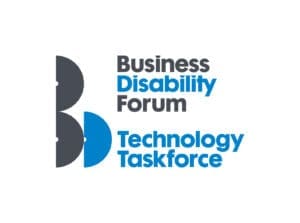Last updated: 4 August 2025
Request for Proposal
This resource was created by our Technology Taskforce, a group of senior IT accessibility individuals from leading UK and global organisations. For more information, including how to join, see our website.

Introduction
A Request for Proposal (RFP) document outlines preliminary requirements for commodities or services. It may dictate to varying degrees the exact structure and format of the supplier’s response.
Effective RFPs typically reflect the strategy and short- and / or long-term business objectives, providing detailed insight upon which suppliers will be able to offer a matching perspective. Disability Smart organisations must include accessibility as part of this proposal.
This document provides an outline of the key criteria you may wish to include within your own RFP.
How much detail should I provide?
This will very much be up to you on how much information you feel is relevant to your supplier and for the kind of contract that you are commissioning. There is always more than can be added to these documents, but below is a simple approach that should work for most suppliers.
Example
[COMPANY NAME] is committed to utilising and making available accessible technologies and products that contribute to the productivity of all of our employees, including those with disabilities. We are also committed to ensuring an accessible, inclusive and barrier-free experience for all our customers including those who might have additional access requirements.
[COMPANY NAME] therefore requires that any technology, products and services that we procure take into account the access requirements of people with disabilities, and adopt a best practice approach to inclusion, accessibility and usability. We also require suppliers to comply with any standards, best practice guidance and regulations concerning their use, including but not limited to:
- World Wide Web Consortium (W3C) Web Accessibility Content Guidelines (WCAG) latest version – minimum AA compliance.
- In the UK: Equality Act 2010.
- For public sector bodies in the UK – The Public Sector Bodies (Websites and Mobile Applications) Accessibility Regulations 2018.
Similar legislation may exist in other countries.
Questions to ask potential suppliers
1. What is your organisation’s Accessible Technology Statement?
2. To what extent are your products and services accessible and usable to people with disabilities? What external standards have you used to qualify this and how have you tested your products and services against them (for example, have you tested features directly with people with disabilities)?
3. If there are aspects of accessibility and usability with which your products or services fail to comply:
a) What adjustments can be made to meet the needs of those users with access requirements?
b) What are you doing to ensure a best practice approach in future so that your approach is fully inclusive – irrespective of anyone’s access requirements?
4. As you develop your products and services, how will you ensure their accessibility and usability for people with disabilities (for example, focus groups and / or direct user testing)?
5. Provide an example of a past project where you have successfully incorporated accessibility and usability in your solution.
6. Best practices on accessibility and usability are continuously evolving: describe how you will ensure that any developments in the design of your products and services will ensure the access needs of people with disabilities are met in future?
Further information
- See our resource, ‘Procurement protocol for assistive technology’ for further information on inclusive procurement.
- Business Disability Forum Partners can access our Procurement Toolkit for more guidance on inclusive procurement. If your organisation is not a Partner, refer to our website for more information about the benefits and how to become a Partner.
- Business Disability Forum Members and Partners can contact our Advice Service for tailored guidance on specific questions.
If you require this content in a different format, contact enquiries@businessdisabilityforum.org.uk.
© This resource and the information contained therein are subject to copyright and remain the property of the Business Disability Forum. They are for reference only and must not be copied or distributed without prior permission.